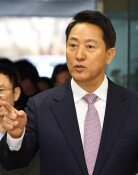Web Shopping Malls Become Hotbed for Fake Goods
Web Shopping Malls Become Hotbed for Fake Goods
Posted December. 02, 2009 07:52,
Police have caught 78 sellers of fake goods over the past year, the Internet open market site 11st said yesterday.
The company installed a clean open market system in September to crack down on fake goods.
Of the 78 arrested, those in their 20s made up the largest share with 43.6 percent or 34, followed by those in their 30s with 35.9 percent or 28, and those in their 40s with 7.7 percent or six. Three teenagers were also booked by police for selling counterfeits.
11st said, We are operating a system in which we give refunds if purchased goods are fakes and report them to police. Surprisingly, most sellers of fakes are teenagers and housewives.
An 18-year-old high school student in September last year was arrested on the charge of selling fake North Face clothes. After obtaining a business certificate, the student sold fakes bought from Seouls Dongdaemun market.
Other merchants used other people names to protect themselves. A 20-something man sold fake goods after registering under five borrowed names.
An officer at the cyber terrorism response team of the National Police Agency said, Many sellers of fakes use the bank accounts of the homeless and steal personal information through the Web to sell fake goods.
Those who sell fake goods will be charged with violations of laws on resident registration, electronic commerce and electronic financial transactions.
Illegal medicines and cosmetics are also being traded on Internet shopping malls. The Korea Food and Drug Administration stopped the sale of the Japanese-made eye cleaning solution Eye Bon on Auction.co.kr, and began an investigation late last month.
The solution is known for cleaning eyes and preventing eye disease but has not gained approval for sale in Korea.
A solution administered directly to the eyes is in circulation without government permission, an official at the administration said. Medicines cannot be sold on the Web without prescription.
Soap reportedly made out of cuckoo feces and known to whiten skin is also being marketed in the country, though its effects have not been proved.
A breast cream whose maker claimed could enlarge breasts is also being sold on the Web, though its sale was banned because of false advertising.
A source at an Internet shopping mall said, Shopping malls are largely responsible for fake goods. Internet open markets themselves should take active steps to curb illegal trading, but have failed to do so while only focusing on expanding their business.
fineday@donga.com







